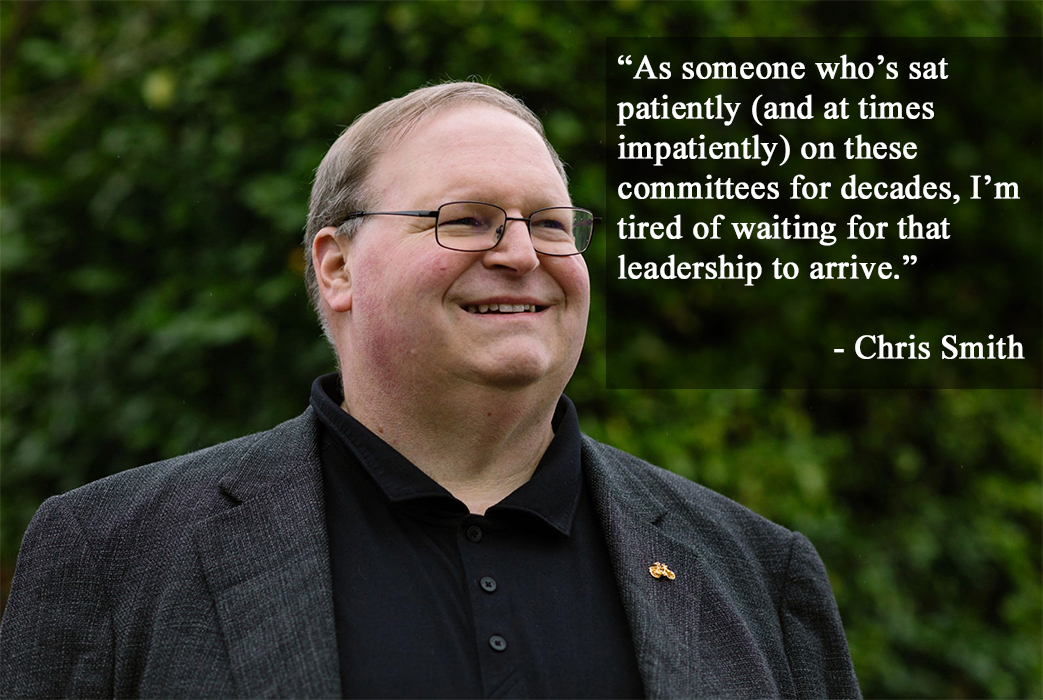
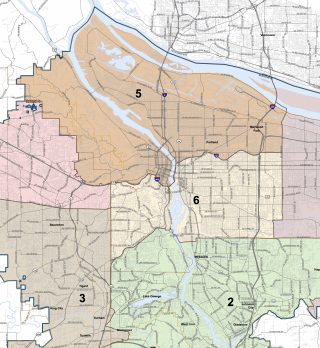
(Metro map)
It can feel awfully daunting to grapple with the numerous challenges that the Portland region is facing.
Our struggles with homelessness and housing affordability, the impending climate emergency, and rampant inequality grow more visceral and explicit with each passing year. To me these challenges are interlinked; our region needs to immediately prioritize reshaping ourselves to build as much housing as possible in dense, walkable communities connected by frequent and reliable transit to have any chance of facing these overlapping crises. Climate change is not just an existential issue but also a lens from which we can begin to address the others.
Over the last two decades, I’ve channeled my advocacy towards promoting sustainable urbanism, long before we knew just how urgent a solution prudent land-use and transportation advocacy would be for addressing the climate crisis.
“Our local government agencies need bold political leaders willing to unapologetically champion and enact the myriad of bold plans that match our aspirations and values.”
I’ve helped draft the plans and policies that can help reduce our carbon emissions while improving the quality of our lives and environment – and time and time again, I’ve watched these plans get delayed, watered down, or not even implemented. (Case in point: we’re building out Portland’s 20-year Bicycle Master Plan at a rate that will complete it in about a century!) It’s clear that our local government agencies need bold political leaders willing to unapologetically champion and enact the myriad of bold plans that match our aspirations and values. These paradigmatic shifts are necessary to stave off the worst of the climate emergency while also preparing the Portland region for our changing demographics and our ongoing housing challenge.
As someone that’s sat patiently (and at times impatiently) on these committees for decades, I’m tired of waiting for that leadership to arrive. That’s why I’m throwing my hat into the race and running for Metro Council.
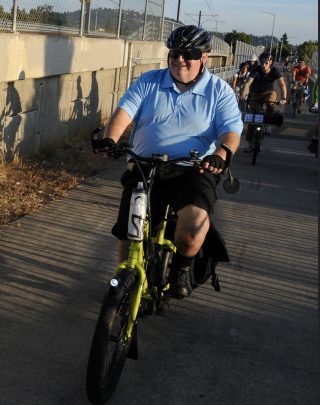
(Photo © J. Maus/BikePortland)
My efforts on appointed commissions over the years have led to demonstrable victories for both housing and the environment. In 2013 I helped prevent industrial development of the last largest chunk of habitat in the region on West Hayden Island when there was no actual economic justification for it. In 2015, I helped keep Pembina’s proposed propane terminal out of our Port. And of course, there’s the ongoing battle to keep the Oregon Department of Transportation (ODOT) from spending almost a billion dollars on a freeway project that won’t make commutes any better and will double down on racist planning trespasses of a previous century.
In my decades of public service on numerous boards and committees, I’ve been fortunate to be part of remarkable initiatives that demonstrate how the right collaboration between civic stakeholders, bold leadership and effective policymakers can produce meaningful victories for equity, sustainability and justice. And yet, in my decades of public service, it’s also deeply apparent that many agencies and commissions are not only disinterested but actively hostile towards requests for transparency and accountability to a growing public interest clamoring for safer streets, climate resilience, and transportation justice.
ODOT and the Port or Portland, in particular, each with massive purse strings and political influence, seem downright unaccountable to local voters and are simply ignoring the youth climate activists pleas to step up and take on the challenges faced by our district, our region and our planet. Indeed, these agencies often seem hell bent on making things worse. ODOT and the Port of Portland keep proposing bad projects rooted in old paradigms of the fossil fuel economy.
Advertisement
“[TriMet] seems more interested in enforcing fares, hiring more cops and building heavily subsidized parking lots than proactively exploring how to make transit reliable…”
While I’ve partnered with TriMet on many occasions to improve transit service, it similarly also seems wrapped up in these twentieth-century paradigms. Listening to its leaders promoting freeway projects is maddening. But TriMet’s biggest sin is one of omission, failing to imagine the massively expanded role it must undertake to provide the region a significantly lower carbon transportation system. The agency seems more interested in enforcing fares, hiring more cops and building heavily subsidized parking lots than proactively exploring how to make transit reliable, foster affordable housing, and listen to community advocates concerned with increased law enforcement.
Metro, with the power of its own elected Council, and as the convener of elected representatives from all 24 cities and 3 counties in the region, is our best hope to refocus these agencies (whose boards are appointed by the Governor and confirmed by the State Senate) to meet the real needs of the people of our region. There’s no reason a State Senator from Southern Oregon should have more say on who makes decisions in our region than our local voters. As a Metro Councilor, I will prioritize advocating for more regional accountability of these entities, and better representation that accurately reflects the diversity of our population and urgency with which Portlanders are demanding unapologetically urgent climate action commensurate with the crisis.
But it’s not enough to stop bad projects, or use the bully pulpit of a Metro Council seat to criticize other underperforming, unaccountable entities. Metro allocates all federal transportation dollars in the region – and as the youth from Sunrise PDX continue to point out, 40% of our region’s greenhouse gas emissions come from transportation. That’s an opportunity to make the transformative investments that we will need to address not only climate, but also to invest in ways that foster equitable development strategies – our own Green New Deal for regional transportation. It’s an opportunity that, as Metro Councilor, I will seize with an urgency commensurate with the climate crisis.
Metro is also unique in its ability to raise revenue across the entire region. We’ve seen this over and over with Parks and Natural Area bonds, and recently with a Housing bond measure. This is another muscle we need to keep developing in our quest for radical modal transformation while advancing equity. Programs like Metro’s Nature in Neighborhoods must be continually supported and expanded to ensure our regional government continues to improve on its ability to serve a demographically changing region.
Advertisement
And while Metro may never be a direct housing provider, its regional revenue scope means it needs to be at the housing table, and it will need to beef up staff and policy capacity to do that. I’m looking forward to taking what I’ve learned about housing and help strengthen Metro’s capacity.
District 5 itself is a cautionary tale. So much of it is ground zero for fossil fuel sacrifice zones. From the levees on the Columbia that will be under increased pressure from high Columbia River flows, to the tank farm on the Willamette that will become a bomb when the earthquake hits. To the two freeways that border the District and the third that splits it in half, creating a cloud of benzene and other air toxics over our neighborhoods. And let’s not forget the auto scrap yards and the mountain of tires that burned in the Cully neighborhood, forcing the evacuation of low income families.
(Photo © J. Maus/BikePortland)
(Photo © J. Maus/BikePortland)
It’s time to change the paradigms; I’m ready and prepared to do it. I’ve spent the last two decades getting schooled for this role. I’ve served at Metro on TPAC and MPAC (don’t worry about the acronyms, just know that I know how Metro makes policy) and I’ve spent more than a decade on the Portland Planning and Sustainability Commission, shaping the Portland Plan, Comprehensive Plan, Climate Action Plan – diving into the details of everything from bike parking to garbage and recycling rates. And I have even more experience that you can see listed on my website.
The IPCC says we have 10 years to take 50% of the carbon out of our economy. I’m the candidate in this race who has tirelessly studied how to decarbonize our region through meaningful changes in transportation and housing policy – and worked with activists, elected officials, policymakers and everyone in between to make it happen. Metro’s a unique agency, and my decades of public service suggest I’m uniquely qualified to employ this agency in the service of our lofty sustainability and equity goals. But I can’t do it without your support. Please visit my website and make a financial contribution – of any size – if you can. You can also help by endorsing me, hosting a house party, or taking on other volunteer roles.
And I most sincerely ask for your vote on May 19.
— Chris Smith @chrisformetro on Twitter and Facebook
— Get our headlines delivered to your inbox.
— Support this independent community media outlet with a one-time contribution or monthly subscription.




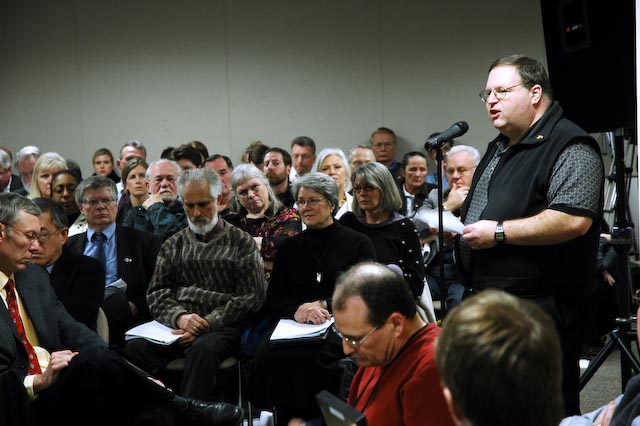



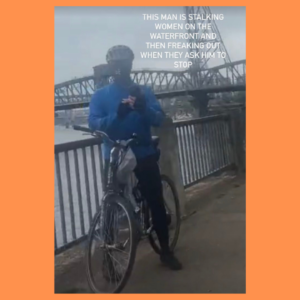
Thanks for reading.
BikePortland has served this community with independent community journalism since 2005. We rely on subscriptions from readers like you to survive. Your financial support is vital in keeping this valuable resource alive and well.
Please subscribe today to strengthen and expand our work.
Chris,
I love you commitment and appreciate what you are saying. I live in District 5 and I am excited to see such a promising candidate emerge. From what I have read from you, I think our priorities and views align nearly completely, so I will throw this out for your consideration. Portland needs to do more on the sustainability part of sustainable urbanism. As we transition to smaller private spaces and more shared experiences, we need to be couple density with equal investments in our public spaces. We need more public spaces and they need to be better. I agree with everything you say about transit and alternative transportation, and I appreciate the efforts from Metro to purchase land, but the openspaces are too exclusive. We need places for families (including with dogs). We need places to walk, jog and mountain bike, and destinations to bike to or take transit to. Metro is very focused on preserving natural resources at the expense of quality recreation. This policy excludes people with limited options and encourages people with option to drive further to meet their recreational needs. Also, our increasing density is coupled with a homelessness crisis that has destroyed the quality and safety of many open spaces. Portland Parks cannot plan to host classes/camps in picnic shelters because they are likely to be occupied and in an unsafe condition. Our beaches and trails are being colonized, and trash and human waste has become a very real problem. I realize the region is currently building more shelter capacity (carrot) but we need to reintroduce the “stick” into our discourse. Allowing our beaches, trails, parks and public amenities become semi-permanent shanty towns with no trash/sewer service is unacceptable. It is unhealthy and unsafe for the people living in those conditions, and destroys the quality of life for everyone in the region. For the working poor, it removes many of their options to enjoy the benefits of being outdoors, for people with more options, they drive to more distant locations. IN short, I agree that we need to develop a more dense City, but the trade-off for living densely must be high-quality, safe public openspaces that are accessible to everyone.
Too true… A N Portland Girl Scouts troop had a bridging ceremony at Overlook Park last year and needed to use the shelter due to rain. It was nasty, full of trash, bio-hazards, and houseless campers and their belongings. So, after many years of long hard work by those wonderful Girl Scouts Portland Parks and Recreation provided a hazardous dump. Those girls deserved a clean location to celebrate, not a frightening den of drug use.
In addition to nearby destinations, we need more parks and greenspaces right in our neighborhoods for people to use on a daily basis.
Is it a requirement that someone running for this seat live in the district, meaning candidates can only run for the seat in the Metro district they live in? Otherwise I don’t get why he would run for this seat when Cameron Whitten is already running for the it. Cameron has plenty of cred and if I lived there I know Cameron would’ve already had my vote before this announcement.
“Chapter V, Section 19 of the Metro Charter requires that a candidate for the position of Metro Councilor “shall be a qualified elector under the constitution of this state when his or her term of office begins and shall have resided during the preceding 12 months in the district from which elected or appointed.”
https://www.oregonmetro.gov/regional-leadership/metro-council/election-information
Cameron is a friend and I have great respect and admiration for him. But I think if you look at my site you’ll see I have a unique set of experiences and skills to bring to the Metro Council. Thanks!
Nobody better than Chris for Metro!
Likewise! I have a ton of respect for Chris and he’ll make a great Metro Councilor!
Chris is truly one of our unsung heroes and would be such an asset on Metro Council; no idea how he has gone up against our dysfunctional institutions –which seem to reward mediocrity and a lack of critical thinking, Ted Wheeler and Kate Brown being the perfect examples– for so long without completely burning out.
A few weeks ago, I testified to the Oregon Transportation Commission about the I5 freeway expansion, and nearly cried as I talked about all the work we parents did to re-open Harriet Tubman Middle School to serve the children of inner north and northeast Portland, who at that point were some of the very few in Portland Public Schools who didn’t have access to a middle school in their neighborhood. Chris had to follow my near-weep fest, and I was so impressed with his ability to speak directly and intelligently to the issues at hand. Thanks, Chris, for all the work you’ve done for so long in Portland, on this and many other issues.
Chris Smith gets it! and has tirelessly added his informed and sane voice to the transportation and planning debate. Time to give him some real power for change before its too late. Chris’s presence on the Metro Council will be huge! As we used to say in Chicago..” Vote early and vote often for Chris Smith!” And send him some $.
I’m hugely impressed with Chris Smith. He brings compassion, knowledge, and the public interest to the table. His years of work reflect this.
I first met citizen activist Chris Smith about 12 years ago when he was introduced to me as someone who might help figure out how to reduce the high number of bicycle-motor vehicle collisions at N. Broadway/Flint/Wheeler. Chris took the time and listened, then put me together with two young activists whose words and work inspire me to this day.
These are two of his gifts, not always seen in politicians, – truly listening, and putting people together. The art of putting people together and inspiring them to act creates a chain reaction that increases advocacy work exponentially.
When Chris speaks, his soft, calm, understated style makes people lean in and listen. The pithy dead-on points he makes hang there in the air. His understanding of the issues, and of political workings, is vast. He knows how to identify what is absolutely key and expresses it in a way that moves people in powerful positions to respond.
District 5 and the entire Metro Region will benefit from Chris’s voice.
Go, Chris! You’ve got my vote too.
Yay Chris! I have been so grateful for your mentorship and leadership for the dozen-plus years I’ve had the honor of knowing you.
Chris good luck…sorry I cannot vote early and often for you from across the river (Vancouver: the non-voting member of METRO…like Puerto Rico in the US Congress. 😉
Chris I hope you are as effective as a METRO rep as you have been as a citizen advocate…but I worry.
So happy to see a candidate talking about the need to hold ODOT and Trimet accountable. I would love to see all the planning work for ODOT, Trimet, and maybe PBOT go through Metro and those agencies are only in charge of doing the building work and maintenance.
It is so frustrating and wasteful that each time we have a new council member in charge of PBOT they change the direction of agency. Or how ODOT is able to slip through the cracks unnoticed and so much of their planning is lobbied for by the construction companies with their own interest. The planning should be seperate.
Having effective government is the only way we are going to create equality and win the war on the climate. Chris would definietly make Metro more effective. He is a hard worker who knows how to build coalitions and get people on board.
Glad you are running Chris! you’ve got my vote.